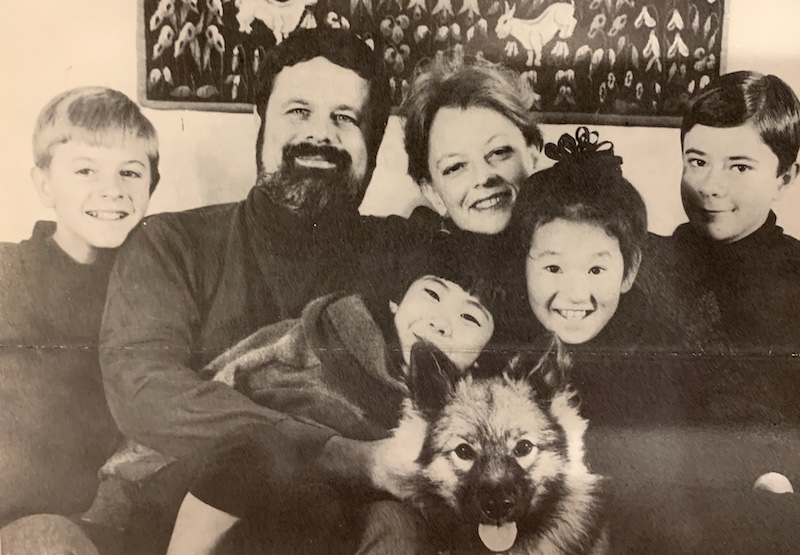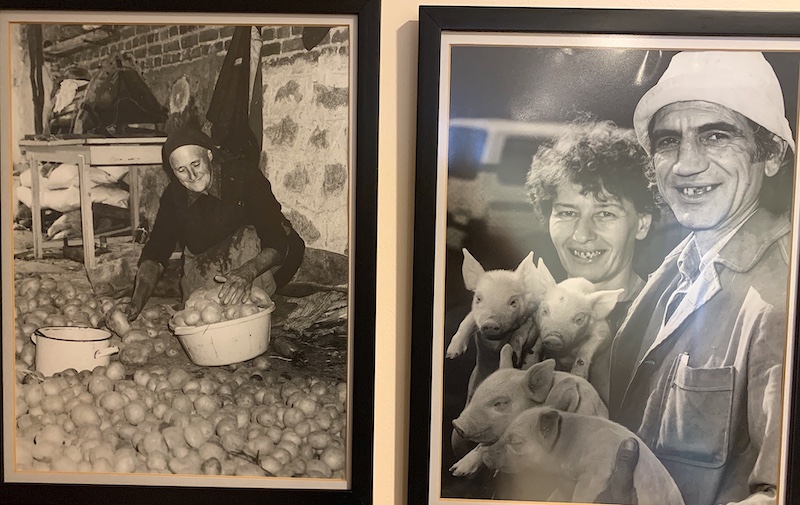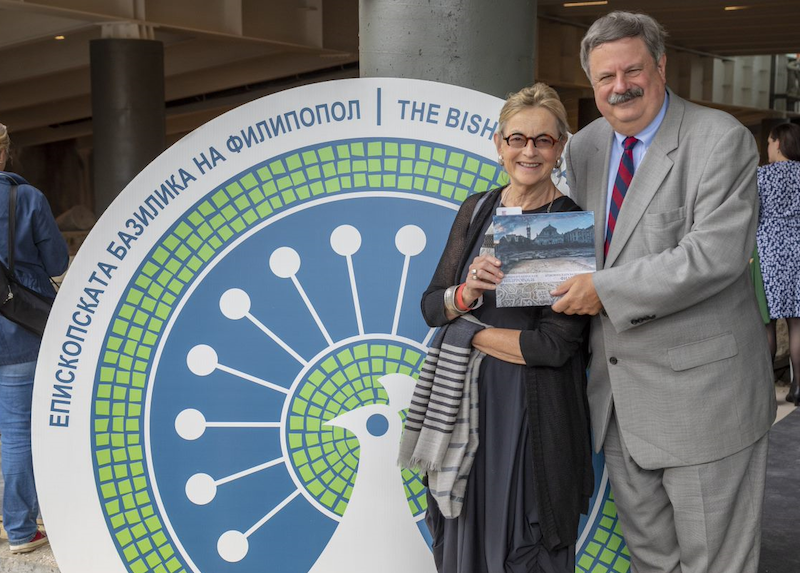
Bulgaria holds pride of place among Ken and Linda Vander Weele’s wall decorations. Art, photographs, and other mementos of the country commemorate the two and a half years the family lived there in the early 1990s.
Their sojourn in Bulgaria was short but memorable, a developmental experience unmatched in intensity and novelty by any other. For their four children, Bulgaria represented many firsts—first school, first girlfriend, first encounter with people who didn’t grow up in a democracy and didn’t take it for granted. For Ken and Linda, the country introduced interesting professional and personal challenges and was the starting point of exciting careers in international development. In Bulgaria, Ken managed an organization that, in conjunction with the Bulgarian-American Enterprise Fund, the predecessor to the America for Bulgaria Foundation, made some of the first small loans to aspiring entrepreneurs in the country. Linda helped lay the groundwork for the fledgling Bulgarian advertising industry.
Ken’s work quickly scaled up to cover the entire Southeast European region, and for easier access to other Balkan countries, the family moved to Vienna, Austria, in the summer of 1995. They left Bulgaria with a sense that they hadn’t given their host country all they could have. So, two decades later, they renewed their connection: Ken joined the Board of the America for Bulgaria Foundation, an endeavor in which Linda has been an enthusiastic companion and that takes them back twice a year, even as they both continue to be employed full-time elsewhere.
“We have really wonderful memories [from Bulgaria], and it’s really fun to keep the adventure going,” Linda says.
The Christmas card the family sent out to friends and work associates in 2019 featured a photo of the couple at the site of the Bishop’s Basilica of Philippopolis—one of the Foundation’s most considerable investments in Bulgaria’s cultural heritage and a testament to how close to Ken’s and Linda’s hearts their Bulgarian “adventure” is.
In this interview for the ABF newsletter, they recall their lives in early 1990s Bulgaria and discuss their current work with ABF tackling obstacles to business development.
A significant part of both your careers is in international development. What prompted that interest for each of you?
Ken: We started in pretty traditional careers in the US. We had some early success, and in the late 1980s I sold the company that I had been a partner in, and we were looking for what to do next. We were introduced to this idea of microfinance—using small business development and small amounts of capital to help people create their own businesses and jobs. We were interested in philanthropy and in how a small amount of money could actually make a huge difference for a family. So, we read more and more about it, and around the same time I actually started a PhD in this field, part-time, so it became a life calling. We switched careers around this idea.
Linda: When we got to a certain age—and we were quite fortunate to have made quite a bit of money on this business sale—we said, “Do we want to spend the next half of our careers doing the same thing, or should we venture out and try something different?” We sent out about 40 resumes to different organizations globally, and we said, “Here we are, here are our skills, accounting and advertising. Would you like a volunteer for a year?” So, we actually volunteered with Opportunity International in Costa Rica, and during that year Opportunity asked us if we would like to come on the payroll.
When you are in a large industrial country and a big city like Chicago, which we live in, to actually make a difference in anything is really quite difficult. But when you go into the developing world, countries that are in transition, your skills are probably more valuable. There is something gratifying about that.
What motivated your decision to move a six-member family to a country fresh out of a communist dictatorship?
Ken: We were connected to a nonprofit, that we are still pretty involved with, called Opportunity International. They create microfinance programs to make small business loans around the world. At the time, they were primarily in Asia and Latin America and in some parts of Africa. Then communism ended, and Eastern Europe became a possibility. We were both on the board of Opportunity at the time, and they were exploring Eastern Europe and had a discussion with the Bulgarian-American Enterprise Fund, led by Frank Bauer and Nancy Schiller, about using Opportunity to create a very early-stage small business loan program in Bulgaria, combining some of Opportunity’s capital with the enterprise fund’s. I did a feasibility study, and we moved to Bulgaria in late 1992.
Linda: We were just in our late 30s, and we were thinking that it would be interesting to take a sabbatical if you will. It was on our mind already to give our children a global experience before they got into the later grades in school. I was quite open to a global posting. I have to be honest that when Opportunity suggested us going to Bulgaria, I had to pull out a map to be sure exactly where it was.
So, you had no idea what to expect. How did this work out for you?
Linda: For me it worked out quite well because, under communism, advertising was not much of a career, so there were a lot of international companies coming to Bulgaria at that time, and there really wasn’t an advertising industry. So, I had opportunities I never would have had in the US. I did the launch campaign for British Cable & Wireless when they had their first cell phones. I did some work for Shell Oil. There were jobs I would not have had a chance to bid on had I been in America.
Ken: We created a foundation in Bulgaria called the Nachala Foundation, and we began to hire and train staff. Opportunity provided all the operating support and operating costs and technology, and the Bulgarian-American Enterprise Fund provided loan capital. While we were there, we made a couple thousand loans ranging from $500 to maybe $5,000, which was quite a bit of money in those days, supporting a lot of early-stage startup entrepreneurs with reasonable two-to-three-year loans. I remember the first loan was to a dentist who wanted to go into private practice. I think it was in Velingrad. We set up quite a few offices of the foundation throughout Bulgaria. It was very rural focused because we wanted to get out of Sofia, and I did quite a bit of travel within that period.

Because of the early success in Bulgaria, a lot of other countries and opportunities began to present themselves. I think we were the first people who tried to do microfinance development in postcommunist Europe, and that actually created more opportunities.
Was it only loans, or did you do mentorship as well?
Ken: There was a lot of mentorship, although our loan officers were pretty new to the business as well, so we did a lot of training of the loan officers with the expectation that they would also do training and mentoring. We also had a couple of affiliations with other programs. We did classroom training. But I think the real value was the mentorship of the loan officers. I think we invested quite a lot in that initial cadre of loan officers.
What were the biggest surprises in early 1990s Bulgaria?
Linda: I remember something I was struck by: people were surprised that we were there! It was very endearing to see people being really excited about us being there and then sort of believing in themselves [as a result].
What was life like for you back then?
Linda: We were living on the side of Mount Vitosha, and one whole wall in the kids’ bedroom was window. One time, there was a storm, and the entire window frame just blew in and then sort of fell apart.
For a year they had some problems with the piping, so I had water once every two or three days for about six hours, and during that time I collected big bins of water, these huge plastic tubs, so we could flush the toilet.
They were also changing the street names back to the original street names and getting rid of all the Russian names, so for somebody who is very dependent on [a map]—you know, I had four kids to get to places—that was a challenge. The street names weren’t there sometimes, sometimes they had the Russian names, and sometimes there were the Bulgarian names. It was clearly a time of huge transition.
Ken: On the business side, one of the challenges was the lack of legal framework and legal certainty both for us creating a lending program and certainly for all the clients trying to start businesses. I think they were frustrated by the lack of legal clarity, legal solutions, licensing issues, corruption. It was a hard time to start a business.
Our oldest child was in the first class of the American College of Sofia. They had assembled a group of a hundred Bulgarian students who spent a year together learning English, and then our son entered that class really in its second year. He was one of a few foreign students in that first class of ACS. But I think he had a good experience, had his first girlfriend, was impressed with how strong students were in a lot of areas. Today, he is a tenured professor of biostatistics at Harvard. The math he learned in Bulgaria was certainly helpful.
Linda: There he met the first honest-to-goodness, real communist, and many of the Bulgarian students there were meeting the first capitalist they had ever met, and on both sides there was heavy propaganda. What you’ve heard all your life about “the communists” and then meeting real, honest-to-goodness peers, who were real people—that was an eye-opening experience both ways. And that was what we wanted for our kids, to have a broader global view.
I didn’t speak the language, so I found a young woman who was an engineer, so she and I started a graphic design/advertising consultancy. So that gave me an opportunity to delve a lot deeper into the culture. That was an exciting and challenging situation because we did a lot of printing, and most of the paper was Russian paper, while most of my clients were international and expected a higher quality. I remember importing German paper, people at the printing company switching out my good German paper and putting in Russian paper. I did an annual report for a client, and there were four different lots of paper, and I was stopping people and saying, “No, no, not that paper. I want my paper.” In each department, you were expected to bring a bottle of whiskey or whatever—incentives! (laughs) That was a learning experience for me.
You reconnected with Bulgaria three years ago, when Ken accepted a position on the ABF board of directors. Why did you decide to join ABF?
Ken: Over the years, I kept being interested in how the Fund had ended up and the transition to the Foundation, and when they did approach me, we had to talk about it, as I am still working full-time. Probably I wouldn’t have wanted to do it for any country other than Bulgaria, but we had lived there, and it was such an intense experience, we had traveled through so much of the country, we had picked up a little language. I also really appreciate the work ABF is doing and the change from the investment side to a giving foundation. I had a lot of respect for the board members I did know. I had kept in touch with Dimiter [Voutchev] from those early days.
I also felt that I left Bulgaria a little too early. I kept coming back until 2000, but I diluted my time around eight other countries. I was pretty stretched. I wanted to reconnect with Bulgaria to see how things had developed.
Linda: I was thrilled. [Our time in Bulgaria] was a developmental time for our kids. It was a fascinating career experience for me. It was the first time really that we were as a family really moving into a different career area. So, the idea of coming back to where all that started and watch the development was exciting.

What changes do you see in Bulgaria three decades later?
Linda: It was unbelievable how much our neighborhood, Dragalevtsi, had developed. It was basically a farming area when we lived there, and now there is a big hotel, paved streets, a really nice park.
Ken: We used to use the Hladilnika tram stop, which was pretty grim in those days, and now this whole area looks a lot better. The part that has impressed me most is the infrastructure, even in smaller towns. Roads, parks, museums—all the public infrastructure looks so much better, seems to function a lot better. I am amazed that in some of the parks in Sofia the fountains work most of the year. They don’t even work in Chicago, so I am impressed that Sofia’s got everything looking great: flowers, landscaping. None of that existed when we were there, and nothing was really functioning.
Linda: Sofia today looks just like any other major city in the West, although the countryside in some places is still struggling.
When we were living in Dragalevtsi, our landlord told us to leave the garbage outside the door because he burned it for fuel. Those are really big things that show the infrastructure makes a huge difference in quality of life, air, security. I remember buses going up the hill to our house belching smoke… and that’s all gone.
Many challenges remain to be resolved. What role do you see for ABF in tackling some of those challenges?
Ken: What’s continued from those days is brain drain. Many of the best and brightest have left. I think one of the challenges is [to determine] what kinds of projects, what kinds of people, we can support that would make it desirable for more and more people to stay. I think some of that’s around education and technology, helping support this burgeoning software sector in many ways and the business environment in general. At a big-picture level, it’s just continuing to make the country more attractive for Bulgarians to stay and build businesses or even come back. I like the RE:TURN effort to promote Bulgaria to the diaspora and make it attractive enough for them to come back and maybe consider starting a business.
What are the biggest obstacles to business development and investment in Bulgaria today?
Ken: Primarily, it’s demographics, which makes growth very difficult. Also, people don’t think they have a fair chance of getting a job or succeeding, or they feel the deck is stacked against them due to corruption or concentration of power in a few hands. So, people tend to leave and look for jobs elsewhere. I think that has driven some of the outward migration. Bulgaria has very little unemployment, so the job market is there. People who left maybe were discouraged because they didn’t see a level playing field. Anything we can do to make that field more fair and balanced I think the Foundation should be doing.
Linda and I went to a donor breakfast for the Bulgarian Anti-Corruption Fund [an ABF grantee, ed.] in Boston and along with a number of other people there made a contribution to ACF, just because I think it would be hard to raise funds in Bulgaria. So, I am glad we were able to help. People care about what ACF is doing. It takes a lot of courage to do that work, and I think they need support, both moral and financial.
You flew in from Chicago for the donor breakfast, which was above and beyond your responsibilities for the ABF board. What is your specific interest in the rule of law field?
Ken: For me it has a lot to do with the business environment. I really feel the key is making Bulgaria a more attractive place to do business. That includes media, rule of law, transparency. An important goal for the Foundation is the business enabling environment, so anything I can do to support that I will do. This will retain entrepreneurs and even bring some back.
Help Linda and Ken ensure there is a level playing field for all individuals and businesses in Bulgaria by supporting the Anti-Corruption Fund.

